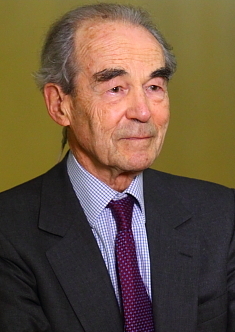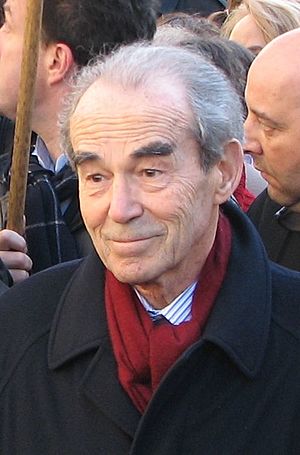Robert Badinter facts for kids
Quick facts for kids
Robert Badinter
|
|
|---|---|
 |
|
| Member of the French Senate | |
| In office 24 September 1995 – 25 September 2011 |
|
| Preceded by | Françoise Seligmann |
| Succeeded by | Philippe Kaltenbach |
| Constituency | Hauts-de-Seine |
| President of the Constitutional Council | |
| In office 19 February 1986 – 4 March 1995 |
|
| Appointed by | François Mitterrand |
| Preceded by | Daniel Mayer |
| Succeeded by | Roland Dumas |
| Minister of Justice | |
| In office 23 June 1981 – 19 February 1986 |
|
| President | François Mitterrand |
| Prime Minister | Pierre Mauroy |
| Preceded by | Maurice Faure |
| Succeeded by | Michel Crépeau |
| Personal details | |
| Born | 30 March 1928 Paris, France |
| Died | 8-9 February 2024 (aged 95) Paris, France |
| Political party | French Socialist Party |
| Spouse | Élisabeth Badinter |
| Children | 3 |
| Alma mater | University of Paris Columbia University |
| Occupation | Lawyer, professor, politician, activist |
Robert Badinter ( 30 March 1928 – 8-9 February 2024) was a French lawyer, politician and author who enacted the abolition of the death penalty in France in 1981, while serving as Minister of Justice under François Mitterrand. He also served in high-level appointed positions with national and international bodies working for justice and the rule of law.
Contents
Early life
Robert Badinter was born 30 March 1928 in Paris to Simon Badinter and Charlotte Rosenberg. His Bessarabian Jewish family had immigrated to France in 1921 to escape pogroms. During World War II, after the Nazi occupation of Paris, his family sought refuge in Lyon. His father was captured in the 1943 Rue Sainte-Catherine Roundup and deported with other Jews to the Sobibor extermination camp, where he died shortly thereafter.
Badinter graduated in law from Paris Law Faculty of the University of Paris. He then went to the United States to continue his studies at Columbia University in New York City where he got his MA. He continued his studies again at the Sorbonne until 1954. In 1965, Badinter was appointed as a professor at University of Sorbonne. He continued as an Emeritus professor until 1996.
Political career
Beginnings
Badinter started his career in Paris in 1951, as a lawyer in a joint work with Henri Torrès. In 1965, along with Jean-Denis Bredin, he founded the law firm Badinter, Bredin et partenaires, (now Bredin Prat) where he practiced law until 1981.
Ministerial mandate (1981–1986)
In 1981, François Mitterrand, a previous self-professed opponent of the death penalty, was elected president and Badinter was appointed as Minister of Justice. Among his first actions was to introduce a bill to the French Parliament proposing the abolition of the death penalty for all crimes, both civilian and military. The bill was passed by the Senate after heated debate on 30 September 1981. On 9 October the law was officially enacted, ending capital punishment in France.
1986–2024
From March 1986 to March 1995 he was president of the French Constitutional Council. From 1995 to 2011 he served as a senator, representing the Hauts-de-Seine département.
In 1989, he participated in the French television program Apostrophes, devoted to human rights, together with the 14th Dalaï Lama. Discussing the disappearance of Tibetan culture from Tibet, Badinter used the term "cultural genocide." He praised the example of Tibetan nonviolent resistance. Badinter met with the Dalai Lama many times, in particular in 1998 when he greeted him as the "Champion of Human Rights," and again in 2008.
In 1991, Badinter was appointed by the Council of Ministers of the European Community as a member of the Arbitration Commission of the Peace Conference on Yugoslavia. He was elected as President of the commission by the four other members, all presidents of constitutional courts in the European Community. The Arbitration Commission has rendered eleven pieces of advice regarding "major legal questions" arisen by the split of the SFRY.
Badinter was the president of the Court of Conciliation and Arbitration for the Organization for Security and Co-operation in Europe (OSCE) 1995-2013.
Badinter opposed the accession of Turkey to the European Union, on the grounds that Turkey might not be able to follow the rules of the Union. He was also concerned about the nation's location, saying: "Why should Europe be neighbour with Georgia, Armenia, Syria, Iran, Iraq, the former Caucasus, that is, the most dangerous region of these times? Nothing in the project of the founding fathers foresaw such an extension, not to say expansion."
As a head of the Arbitration Commission, he gained high respect among Macedonians and other ethnic groups in the Republic of Macedonia because he recommended "that the use of the name 'Macedonia' cannot therefore imply any territorial claim against another State." He supported full recognition of the republic in 1992. Because of that, he was involved in drafting the so-called Ohrid Agreement in the Republic of Macedonia. This agreement was based on the principle that ethnic-related proposals passed by the national assembly (and later to be applied to actions of city councils and other local government bodies) should be supported by a majority of both Macedonians and Albanian ethnic groups. The latter minority comprises about 25% of the population. This is often called the "Badinter principle".
Badinter was elected to the American Philosophical Society in 2009.
World Justice Project
Badinter served as an Honorary Co-Chair for the World Justice Project. It works to lead a global, multidisciplinary effort to strengthen the rule of law for the development of communities of opportunity and equity.
Awards
He refused any honorary distinction from the National Order of the Legion of Honor (same as his wife) and the Ordre National du Mérite. He nevertheless received foreign decorations, notably the Order of Tomáš Garrigue Masaryk (Czech Republic) in 2001. and the Order 8-September (North Macedonia) in 2006. As a longstanding activist for the abolition of the death penalty, Robert Badinter was appointed an honorary member of the International Commission Against the Death Penalty.
Personal life
Badinter married philosopher and feminist writer Élisabeth Bleustein-Blanchet, daughter of Marcel Bleustein-Blanchet, who was the founder of Publicis. He died during the night of 8 to 9 February 2024, at the age of 95.
Summary of political career
- President of the Constitutional Council of France: 1986–1995.
- Political appointee:
- Minister of Justice : 1981–1986 (Resigned when named as President of the Constitutional Council of France).
- Electoral office:
- Senator of Hauts-de-Seine : 1995–2011. Elected in 1995, reelected in 2004.
See also
 In Spanish: Robert Badinter para niños
In Spanish: Robert Badinter para niños


